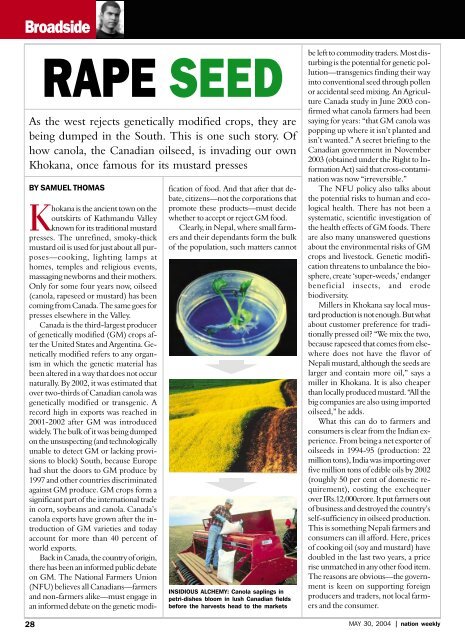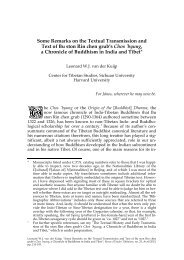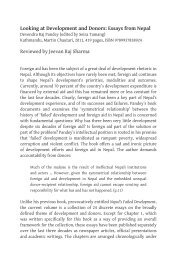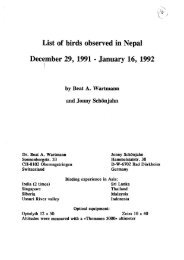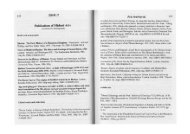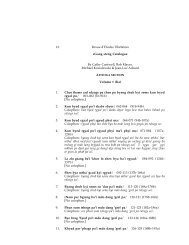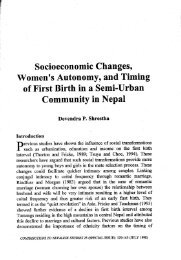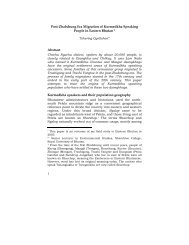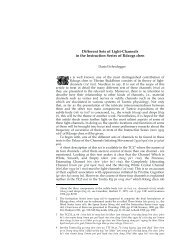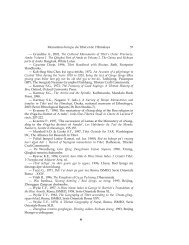You also want an ePaper? Increase the reach of your titles
YUMPU automatically turns print PDFs into web optimized ePapers that Google loves.
Broadside<br />
28<br />
RAPE SEED<br />
As the west rejects genetically modified crops, they are<br />
being dumped in the South. This is one such story. Of<br />
how canola, the Canadian oilseed, is invading our own<br />
Khokana, once famous for its mustard presses<br />
BY SAMUEL THOMAS<br />
Khokana is the ancient town on the<br />
outskirts of Kathmandu Valley<br />
known for its traditional mustard<br />
presses. The unrefined, smoky-thick<br />
mustard oil is used for just about all purposes—cooking,<br />
lighting lamps at<br />
homes, temples and religious events,<br />
massaging newborns and their mothers.<br />
Only for some four years now, oilseed<br />
(canola, rapeseed or mustard) has been<br />
coming from Canada. The same goes for<br />
presses elsewhere in the Valley.<br />
Canada is the third-largest producer<br />
of genetically modified (GM) crops after<br />
the United States and Argentina. Genetically<br />
modified refers to any organism<br />
in which the genetic material has<br />
been altered in a way that does not occur<br />
naturally. By 2002, it was estimated that<br />
over two-thirds of Canadian canola was<br />
genetically modified or transgenic. A<br />
record high in exports was reached in<br />
2001-2002 after GM was introduced<br />
widely. The bulk of it was being dumped<br />
on the unsuspecting (and technologically<br />
unable to detect GM or lacking provisions<br />
to block) South, because Europe<br />
had shut the doors to GM produce by<br />
1997 and other countries discriminated<br />
against GM produce. GM crops form a<br />
significant part of the international trade<br />
in corn, soybeans and canola. Canada’s<br />
canola exports have grown after the introduction<br />
of GM varieties and today<br />
account for more than 40 percent of<br />
world exports.<br />
Back in Canada, the country of origin,<br />
there has been an informed public debate<br />
on GM. The <strong>Nation</strong>al Farmers Union<br />
(NFU) believes all Canadians—farmers<br />
and non-farmers alike—must engage in<br />
an informed debate on the genetic modi-<br />
fication of food. And that after that debate,<br />
citizens—not the corporations that<br />
promote these products—must decide<br />
whether to accept or reject GM food.<br />
Clearly, in Nepal, where small farmers<br />
and their dependants form the bulk<br />
of the population, such matters cannot<br />
INSIDIOUS ALCHEMY: Canola saplings in<br />
petri-dishes bloom in lush Canadian fields<br />
before the harvests head to the markets<br />
be left to commodity traders. Most disturbing<br />
is the potential for genetic pollution—transgenics<br />
finding their way<br />
into conventional seed through pollen<br />
or accidental seed mixing. An Agriculture<br />
Canada study in June 2003 confirmed<br />
what canola farmers had been<br />
saying for years: “that GM canola was<br />
popping up where it isn’t planted and<br />
isn’t wanted.” A secret briefing to the<br />
Canadian government in November<br />
2003 (obtained under the Right to Information<br />
Act) said that cross-contamination<br />
was now “irreversible.”<br />
The NFU policy also talks about<br />
the potential risks to human and ecological<br />
health. There has not been a<br />
systematic, scientific investigation of<br />
the health effects of GM foods. There<br />
are also many unanswered questions<br />
about the environmental risks of GM<br />
crops and livestock. Genetic modification<br />
threatens to unbalance the biosphere,<br />
create ‘super-weeds,’ endanger<br />
beneficial insects, and erode<br />
biodiversity.<br />
Millers in Khokana say local mustard<br />
production is not enough. But what<br />
about customer preference for traditionally<br />
pressed oil? “We mix the two,<br />
because rapeseed that comes from elsewhere<br />
does not have the flavor of<br />
Nepali mustard, although the seeds are<br />
larger and contain more oil,” says a<br />
miller in Khokana. It is also cheaper<br />
than locally produced mustard. “All the<br />
big companies are also using imported<br />
oilseed,” he adds.<br />
What this can do to farmers and<br />
consumers is clear from the Indian experience.<br />
From being a net exporter of<br />
oilseeds in 1994-95 (production: 22<br />
million tons), India was importing over<br />
five million tons of edible oils by 2002<br />
(roughly 50 per cent of domestic requirement),<br />
costing the exchequer<br />
over IRs.12,000crore. It put farmers out<br />
of business and destroyed the country’s<br />
self-sufficiency in oilseed production.<br />
This is something Nepali farmers and<br />
consumers can ill afford. Here, prices<br />
of cooking oil (soy and mustard) have<br />
doubled in the last two years, a price<br />
rise unmatched in any other food item.<br />
The reasons are obvious—the government<br />
is keen on supporting foreign<br />
producers and traders, not local farmers<br />
and the consumer.<br />
MAY 30, 2004 | nation weekly


